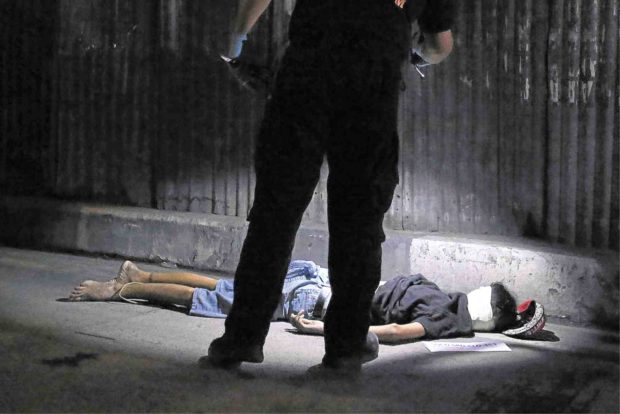
Human rights advocates have been calling out President Rodrigo Duterte’s drug war, under which many police operations ended up in scenes like this. (File photo by RAFFY LERMA / Philippine Daily Inquirer)
MANILA, Philippines — Human Rights Watch (HRW), a New York-based international group, isn’t buying the statement of President Rodrigo Duterte that he once ordered a “discreet” probe into the extrajudicial killings (EJKs) being blamed on his administration.
“President Duterte’s claim that thousands of extrajudicial killings since 2016 are the result of rivalry between drug syndicates is specious, self-serving, and utterly without basis,” Phil Robertson, HRW deputy director in Asia, said in a statement issued on Tuesday.
“The ‘hearing’ he claimed to conduct to arrive at this far-fetched conclusion was never disclosed to the public, raising questions about whether it ever happened at all,” he added.
Robertson noted that, if Duterte really had serious doubts about his drug war operations, he could have called for a more credible investigation — not something hidden from the public eye.
“Instead, he made sure that experienced international investigators, such as the UN special rapporteur on extrajudicial killings Agnes Callamard, were not permitted to set foot in the Philippines,” Robertson said.
Duterte, during his pre-recorded address about the COVID-19 situation that aired late Monday night, revealed that he had ordered a probe on EJKs because he also had concerns about it.
He said that the information that reached him blamed the killings on warring drug syndicates trying to get control over a specific territory.
Some cases, Duterte said, involved botched-up drug transactions between pushers and users, with a quarrel over drug money resulting in killings.
Duterte said police officers were not involved, although he also admitted the possibility that some of them might have been involved in a drug recycling scheme, under which substances seized during anti-drug stings were sold again on the street.
“Truthfully, I also had my doubts,” Duterte, speaking partly in Filipino, said before members of his Cabinet. “There was a time when I conducted a discreet hearing. The information that reached me was that sometimes there is a rivalry of the turf — their territory, as to who was controlling it,” Duterte said before members of his Cabinet.
“Second, someone ran away with the money. And third, their [drugs] were stolen at the street level. That’s what we don’t know. They said it was the police [who did it]. But, you know, if I were a policeman, I would go all out. why would I get from those at the street level, or what they called garbage collectors [basurero],” he added.
But for the HRW, Duterte’s claim was merely an excuse, fake stories that would divert attention from allegations that police officers were involved in EJKs.
The President became a controversial figure after his election in 2016 as he waged a widespread and bloody campaign against illegal drugs, which was marred by accusations that state forces were involved in the EJKs.
In all the suspected EJKs, only three officers were convicted of murder, and these were the Caloocan policemen involved in the slay of teeanger Kian de los Santos.
“No one should forget that the ‘drug war’ killings immediately after Duterte was elected as president in 2016. Since then, thousands have died and with the exception of the case of Kian de los Santos, there has been no successful prosecution of either police officers or mysterious civilian killers,” Robertson said.
“Human Rights Watch and other groups credibly established that police or other local authorities perpetrated most of the killings. In many of these incidents, police routinely manufacture evidence, by planting drugs and weapons on dead suspects at the scene of the alleged crime, to justify their claim that the suspects had fought back,” he added.
[atm]